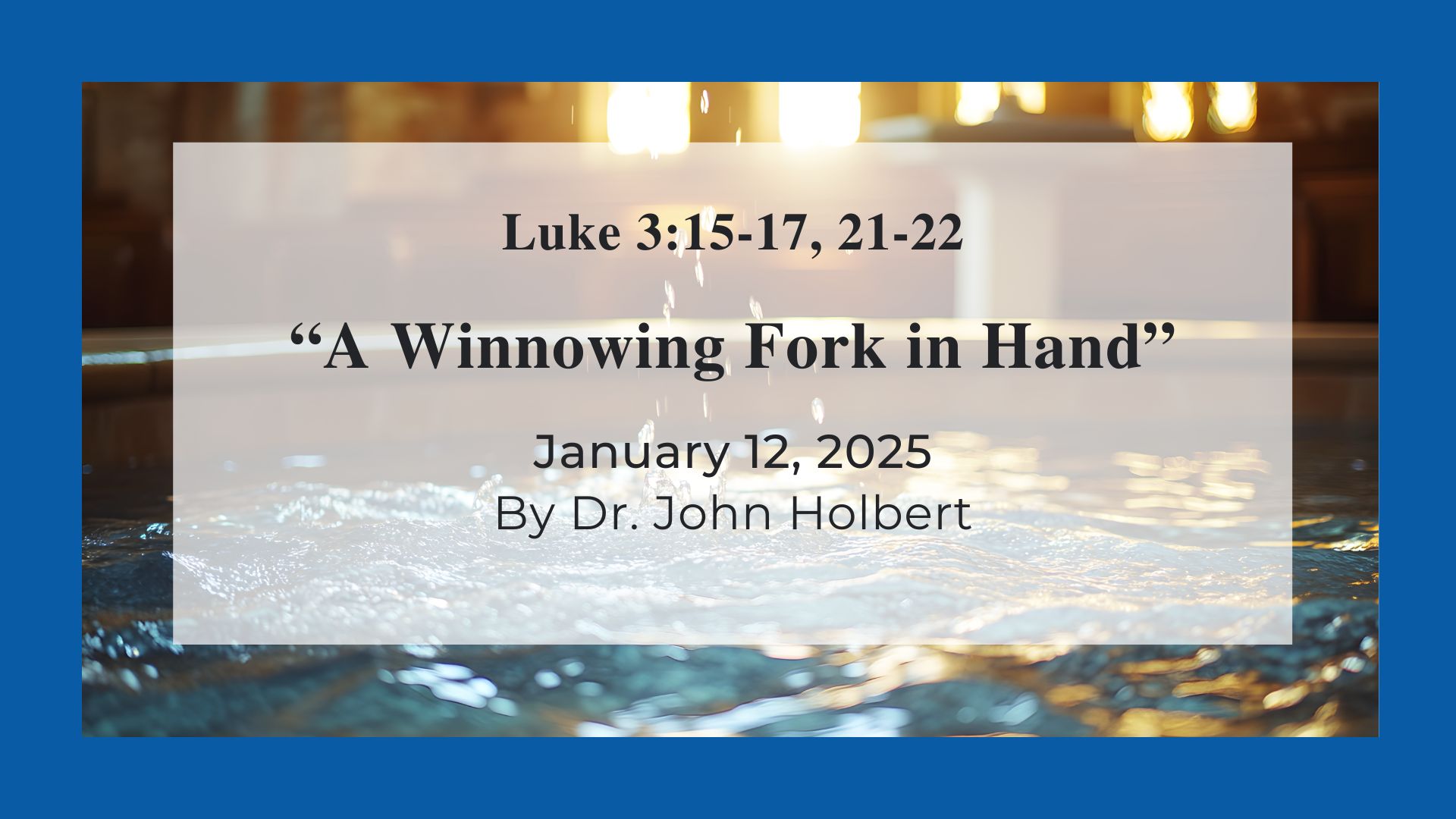A Winnowing Fork in Hand - Reflections on Luke 3:15-17, 21-22, Baptism of the Lord, Year C
by John Holbert on Wednesday, December 25, 2024

“The people had expectations about John.” Each of the gospels deals with the work of John the Baptizer in a different way, but each one concludes that John is not the Messiah, long-expected in Judaism, but merely points to the true Messiah who is Jesus of Nazareth. Still, when they saw and heard John “in the area all around the Jordan” (Luke 3:3), they were more than curious about anyone who “announced a baptism for conversion leading to forgiveness of sins,” who appeared to fulfill those ancient and familiar words from Isaiah 40: “a voice of one crying in the desert,” who spoke angry words, naming his hearers “offspring of vipers,” among other taunts. “Any tree that does not produce good fruit is being cut off and thrown into the fire” (Luke 3:9). John was plainly no one to be trifled with! But could he be the Messiah? “They wondered inwardly (to themselves) whether he might be the Messiah” (Luke 3:15).
John answered that speculation with his usual lack of tact, shouting, “I am baptizing you with water. But the one stronger than I is coming. I am not fit to loose the straps of his sandals. He will baptize you with a Holy Spirit and with fire. He has his winnowing fan (fork) ready to clear his threshing floor. He will gather the wheat into his barn, but the chaff he will burn with an unquenchable fire” (Luke 3:16-17). In other words, John might be understood to say, “You think I am bad! What until you set eyes on Messiah; you will know him by his trusty winnowing fork!”
I had a now deceased colleague who was fond of asking why he never saw in any church a stained-glass window depicting Jesus with a winnowing fork in his hand? Too many scenes of gentle Jesus, meek and mild, he would say. John promises an uncompromising, sometimes angry Messiah, not unlike himself, who will separate wheat from chaff and chuck the latter in the trash. And of course that is precisely why Luke depicts John as he does; his role is to prepare for the Messiah’s coming, not to be the Messiah himself.
This is why Luke adds material about John not to be found in the other gospels. John’s ministry to tax collectors, soldiers, and other people is based squarely on the problems engendered by misuse of possessions, a central Lukan theme. To resist the temptations to extortion, to blackmail, to financial gouging, and acquisitive greed, and to begin sharing with the needy, is the proper action of true faith. By preaching like that, John is “preparing a people ready for the Lord” (Luke 1:17).
It is of course both surprising and unique that Luke says in his gospel that John does not baptize Jesus. That is impossible because before the baptism “Herod the tetrarch (i.e. Herod Antipas, son of Herod the Great), because he was convicted by John concerning Herodias his brother’s wife and all evil things he had done, added this to everything else, that he shut John up in prison” (Luke 3:19-20). Jesus is baptized only after John has been jailed for accusing Herod of impure relations with his brother’s wife. In Mark and Matthew, this fact leads to John’s grisly beheading, but Luke says nothing of that.
What appears to be important for Luke is that he wants his readers to see that there is a clear sequence between these two prophets, John and Jesus, and that the latter is Messiah, merely foretold by the former. When Jesus is anointed by the Spirit at his baptism, without John, who has been moved off the stage, that fact is plainly separated from John altogether. There is no overlapping between the ministry of John and the ministry of Jesus. At the same time, the central announcements of the two prophets are quite compatible: salvation and judgment are both part of the call of God. A positive response of active faith is required. Without that response, even those who are part of the historical chosen people of God will be unfruitful trees cut off, or, heaven forbid, like chaff thrown into an endless fire. Both John and Jesus bear a similar winnowing fork, and those who would follow either of them should be well advised to respond appropriately in faith. That is one of the central demands of Luke’s gospel, the proper response to Jesus in a faith based in justice.
